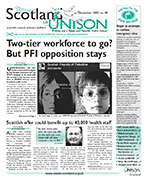|
|
December
2002 No 40
|
|
||
Two-tier workforce to go? But PFI opposition staysUNISONScotland has welcomed a new protocol signed by the Scottish Executive and the STUC designed to do away with the scandal of the two-tier workforce in PFI/PPP schemes across Scotland's public sector. |
||||
|
Scottish offer could benefit up to 40,000 health staff
|
||||
| Anger at attempts to confuse emergency roles UNISON has roundly condemned attempts to confuse the roles of paramedics and emergency ambulance control staff as a way of putting pressure on striking firefighters. |
||||
| Fire Service:
'Modernisation' all too often just means cuts As SiU went to press, firefighters' leader Andy Gilchrist revealed that cuts planned as part of 'modernisation' would be equivalent to closing the Fire Service in Scotland. |
||||
| NHS Agenda
for Change published but leaks condemned UNISON has condemned the use of press leaks of the negotiations on the new pay structure in the NHS - Agenda for Change - in an attempt to undermine the firefighters dispute. |
||||
|
Progress shows need to build on shared values |
||||
| Burns competition
with South Africa? South African High Commissioner plans Burns Supper at South Africa House in London. |
||||
| Website course
success Last month, 13 branch activists attended a Communications & Campiagns Committee introductory course on web design and building. |
||||
| Lesbian and
Gay Conference puts off redefinition UNISON's 10th* National Lesbian and Gay Conference, held in Plymouth, put off a redefinition of the Self Organised Group into the Lesbian, Gay, Bisexual and Transgender Group, agreeing to have more discussion with members affected by the issue and revisit this debate next year. |
||||
| Social
Work: Problems stretch across the service UNISON has submitted evidence to a Cosla Working Party on recruitment and retention in the social work workforce. |
||||
| Nursery Nurses
face crunch meeting Scotland's local government service group have called a delegate meeting of nursery nurses on 15 January, to discuss the claim for pay, grading and proper recognition of the work they do. |
||||
| Partnership
and work-life balance head Local Government policy discussion
Discussions in November's Scottish Local Government Service Group Executive's (SGE) Policy Seminar, centred round the STUC/ Scottish Executive Protocol on PPP, Partnership working, work-life balance and the SGE's own structures. |
||||
| 800,000
plus take industrial action This year has been a particularly busy one for UNISON's Industrial Action Committee. There have been around 90 ballots, involving some 25,000 members. |
||||
| Fife
Branch supports African HIV/AIDS initiative
UNISON Fife branch is supporting the work of South African HIV/AIDS initiative Wola Nani by selling beaded red ribbons made by the project's clients. So far over £1000 has been raised. |
||||
| Social Work
lessons from Canada visit Colin Turbett, Chair North Ayrshire Branch, reports on how front line Social Workers deliver services in Canada. |
||||
| Scottish Friends
of Palestine 2003 Calendar UNISONScotland has sponsored a calendar produced by Scottish Friends of Palestine. |
||||
| Unofficial strike off | ||||
| We want to hear your news Scotland inUNISON contacts | ||||

